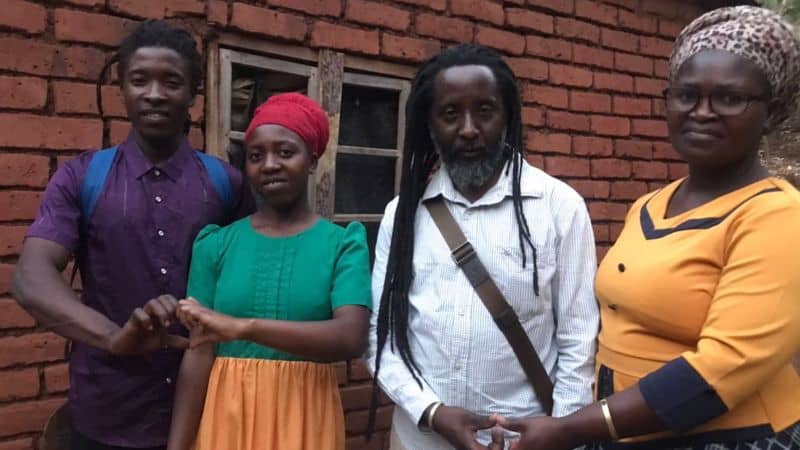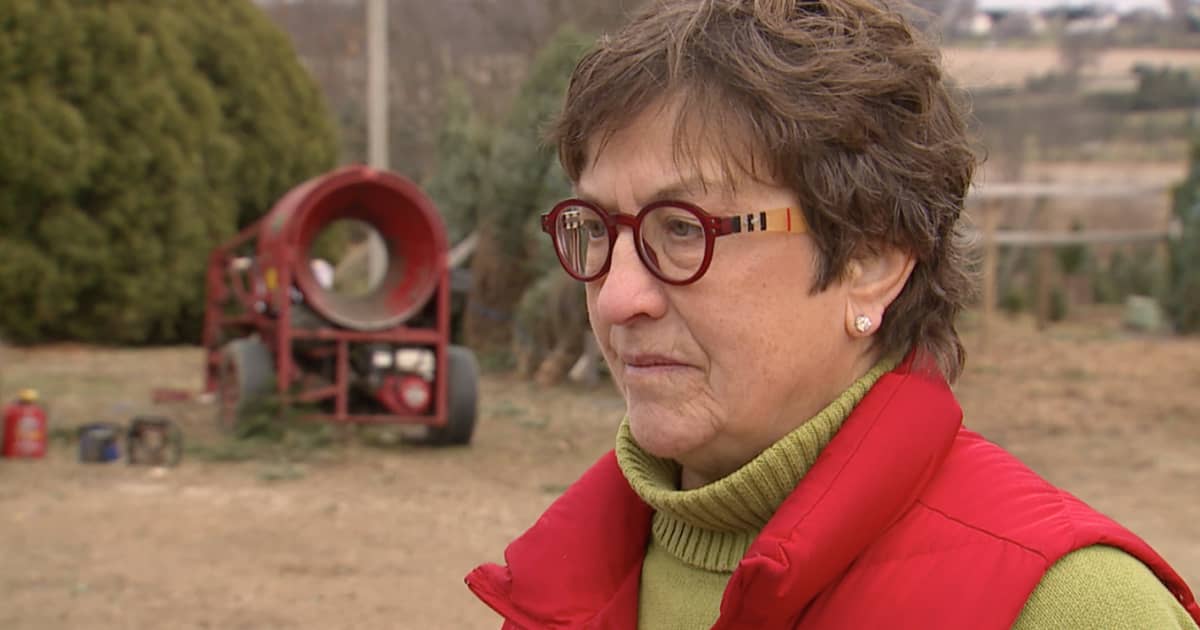CNN — In New York City, hundreds of migrants are staying in current or former school gymnasiums. In Chicago, dozens of migrants have been sleeping in a police station. And in Florida,

CNN
—
For years, Alli Nansolo grappled with whether to cut his son’s dreadlocks or not. Although it is not a legal requirement in Malawi, an unwritten policy enforced across government schools meant his son was being denied admission because of his hair.
Nansolo’s could not pay for private education for his son Ishmael from his modest dressmaking income and cutting his hair, an important symbol of their Rastafari religion, was inconceivable to him.
“Rastafari is a spiritual way of life. Keeping dreadlocks is like we are committing ourselves to a vow before the most high creator that we will serve him in our life without denying his laws or commandments,” Nansolo told CNN.
The 48-year-old makes between 200,000 to 300,000 Malawian Kwacha (around $194 to $291) monthly, while his wife Empress supplements the family’s income by selling secondhand clothes.
“I felt oppressed,” Nansolo said as he recalled the staff of a state-run secondary school in Zomba, southern Malawi. refusing to register Ishmael because of his hair.
Nansolo said he contacted an officer at the Ministry of Education who advised him to cut his son’s hair so that he could go to school.
Nansolo found himself caught up in the discriminatory policies of Malawian public schools and decided to take legal action against the Ministry of Education, along with a group of parents.
“I went to the Women Lawyers Association of Malawi to ask for help. The association accepted and we went to court in November 2017,” he said.
For three years, Ishmael, then 15, would remain out of school as the court case dragged on.
Then, in 2020, the Malawi High Court placed an interim order compelling public schools to enroll Ishmael and other Rastafari children until a final ruling was reached.
It was a legal victory that marked a significant milestone for the estimated 15,000 Rastafarian community in Malawi, according to Nansolo, who is also a community elder.
However, the temporary relief did not address the broader issue of discrimination that around 1,200 affected students face, their lawyer Chikondi Chijozi told CNN.
“We saw a number of Rastafari children being admitted into government schools but there were still reported cases of children of [the] Rastafari community being denied admission into government schools, and their parents were forced to take the court injunction to the school to compel them to admit them,” Chijozi said.
‘Free’ at last, but challenges remain
After a six-year legal challenge, the Malawian High Court delivered a landmark ruling on May 8.
The court ruled that it was unlawful to require learners, including Rastafarian kids, to cut their hair before they are enrolled into public schools.
The ruling came into immediate effect but the government has until June 30 to issue a nationwide statement mandating acceptance of all dreadlocked children into school.
Chijoki told CNN: “We got a judgment from the court which essentially upheld the rights of the Rastafari children and abolished the policy that requires all learners, including Rastafari children, to cut off their dreadlocks for them to be admitted into government schools.”
Nansolo expressed his community’s jubilation that their children could now finally continue their education.
“The judgment means that we are now free because most of us in [the] Rastafarian community don’t earn much, so we couldn’t manage to send our children to private schools,” Nansolo said.
“We are happy seeing that our children will now be going to public schools without being sent back or denied their right to education.”
CNN has contacted the education ministry for comment on the ruling.
Despite this victory, Malawi’s Rastafarian community still faces numerous challenges. Unemployment, poverty, and corporate discrimination persistently plague the community. Data on the community is hard to come by but the US State Department says around 5.6 percent of Malawi’s nearly 21 million population is formed of other religions including Hindus, Baha’is, Rastafarians, Jews, and Sikhs.
“Most of us rely on business to survive. Lack of jobs is a big challenge for the Rastafarian community because those in offices are reluctant to employ Rastas,” Nansolo said.
“The corporate world feels that being Rastafari is associated with criminality, but we are not like that.”
Don't Miss
WOOSTER, Ohio — For Rita Dush, Christmas trees hold many meanings. “Stewardship of the land, beauty, and happiness for families,”
Digital Brief: Dec. 3, 2022 (AM) Digital Brief: Dec. 3, 2022 (AM) 02:59 BRICK, N.J. (CBS) — Two people in
CNN — Before music streaming was popular, Nigerian group P-Square was already among the pioneers of the sound now dubbed
CNN
—
In New York City, hundreds of migrants are staying in current or former school gymnasiums.
In Chicago, dozens of migrants have been sleeping in a police station.
And in Florida, where the Republican governor has sent migrants to Democratic-led cities across the country, the state has hired three companies to relocate migrants from the state.
While the surge of new migrants after last week’s expiration of Title 42 was not as large as many expected, the scramble to place asylum seekers who trekked thousands of miles to flee violence or crushing poverty has yielded widespread tensions within and between states.
And more parts of the US could suddenly find themselves with unexpected migrants.
About 300 migrants have been placed in current and former school gyms in New York City, a source familiar with the planning process told CNN.
As of Monday, 220 migrants were in the gym of a former school on Staten Island, the source said. Less than 80 migrants have been housed at a gym at PS 188 on Coney Island, and fewer than 30 have been placed at a gym at PS 17 in Williamsburg, the source said.
The gyms are not physically connected to the schools, the source added.
Some New York City parents were dismayed or bewildered to learn of the city’s plan to temporarily house migrants in 20 school gyms.
“I would like other places to be considered,” Samantha Clark told CNN affiliate WABC. “Our school is tiny. We can barely fit in it as it is.”
Aramis Rosa said he sympathizes with the migrants but also opposes the plan to house them in school gyms.
“We’re not against them,” Rosa told WABC. “They’re all welcome – just not to our school, next to our children.”
Mayor Eric Adams has said the migrants would not interact with students, but that did little to assuage concerns from parents.
Outside PS 17 in Brooklyn, a group of parents and students protested Wednesday morning over migrants being housed in the school’s gym.
About 100 people marched around the block chanting, “We want our gym back!” and “Let us play!”
Parents and children alike carried signs reading, “We need recess,” “No asylum on school grounds,” and “Safety first.”
One protest organizer stressed the need to support migrants – though she didn’t think housing them on school grounds was appropriate.

“What we’re gonna do is we’re going to support them. All of you kids are going to help us write notes, and we’ll make care packages, for all the people coming through here,” the organizer announced to the crowd.
“We wish them well. We care. But they shouldn’t be on school grounds, and not in a place that only has three bathrooms for 100 people, right?”
Elsewhere in the state, a New York state supreme court judge has granted a temporary restraining order blocking New York City’s mayor from sending asylum seekers to nearby Orange County to try to ease the influx of migrants arriving in the nation’s most populous city.
The order, requested last week by Orange County Executive Steven Neuhaus, allows for the 186 asylum seekers already staying at the Crossroads Hotel and Ramada by Wyndham in the town of Newburgh to stay in the county, according to the filing.
But new migrants won’t be allowed to stay at the hotels if any of the current occupants leave, the order states.
The pushback comes as New York City scrambles to house a crush of migrants – some of them bused to New York by Republican governors and local officials from Southern states.
Since last spring, New York City has processed more than 65,000 migrants and around 35,000 remain in the city’s care, city officials have said. The city has opened more than 140 emergency shelters and eight large-scale humanitarian relief centers to manage the crisis, the mayor said.
And a wave of new asylum seekers arrived last week with the expiration of Title 42 – the Trump-era policy enacted early in the Covid-19 pandemic that allowed authorities to quickly expel migrants at US land borders.
New York Gov. Kathy Hochul last week asked for federal government assistance with constructing and operating temporary shelters “in anticipation of several thousand asylum seekers arriving in New York City every week.”
Adams’ office said it’s disappointed in the judge’s ruling.
“New York City has cared for more than 65,000 migrants – sheltering, feeding, and caring for them, and we have done so largely without incident,” Adams’ press secretary Fabien Levy told CNN on Tuesday night.
“We need the federal government to step up, but until they do, we need other elected officials around the state and country to do their part. New York City is out of space and we’re only asking Orange County to manage approximately ¼ of 1% of the asylum seekers who have come to New York City, with New York paying for shelter, food, and services.”
But the executive of Orange County said, “New York City should not be establishing a homeless shelter outside of its borders in Orange County.”
“The city is a self-proclaimed sanctuary city; Orange County is not,” Neuhaus said in a statement. “We should not have to bear the burden of the immigration crisis that the Federal government and Mayor Adams created, and I will continue to fight for Orange County’s residents in regard to this important manner.”
The New York Immigration Coalition, an immigrant’s rights advocacy group, criticized both Adams and Neuhaus, saying the two need to start working together in coordinating and addressing the needs of asylum seekers in the region.
“But County Executive Neuhaus shouldn’t be gloating about the judge’s temporary restraining order. His actions in response to asylum seekers to his region have been shameful – he has done nothing more than stoke fear and resentment in his community,” NYIC Executive Director Murad Awawdeh said in a statement.
“At a moment when he should be choosing to welcome, he has instead chosen cruelty.”
Hundreds of migrants have been staying in Chicago city buildings after they were “inhumanely” bused to Chicago, former Mayor Lori Lightfoot said earlier this month, according to CNN affiliate WBBM.
During her final days in office, Lightfoot issued an emergency declaration in hopes of getting federal and state money to help the city respond to the crisis.
More than 70 migrant families were staying in the Chicago Police Department’s 12th district station.
“I’ve been here for two weeks,” Johon Torres, a migrant from Venezuela, told WBBM. Torres was joined by his three daughters and niece.
The families in limbo have received donated supplies from refugee organizations, good Samaritans and even some police officers.
But the situation is not tenable, said Sgt. James Calvino of the Chicago Police Sergeants’ Association.
“It’s ballooned exponentially – way out of control,” Calvino told WBBM.
Florida Gov. Ron DeSantis’ administration has chosen three companies to execute the next phase of its migrant relocation program, according to documents obtained by CNN.
The Florida Division of Emergency Management selected Vertol Systems Company Inc., ARS Global Emergency Management and GardaWorld Federal Services to “manage and implement a program to relocate individuals” who have been processed and released by the US government, according to a FDEM document.
The contract sets up the framework to once again send migrants to Democratic-led cities, as seen in 2022 when Vertol Systems Company Inc., provided two planes to relocate migrants from San Antonio, Texas, to Martha’s Vineyard, Massachusetts, under DeSantis’ direction.
The state requires vendors to be “solely responsible” from beginning to end of the transporting of participants, including social services that should be provided to them at the destination cities.
The newly selected vendors are tasked with providing ground and air transportation services to assist with what the DeSantis administration is calling the “voluntary relocation of Inspected Unauthorized Aliens,” who have agreed to be relocated from “Florida, or another state, to a location within the United States.”
The FDEM did not indicate the number of migrants expected to be transferred and says it will be determined “based on circumstances on the ground.” One vendor noted its capability of moving 40-50 passengers per week, or about 2,200 a year.
A document showing questions and answers between unnamed vendors and the FDEM, posted on the state’s contract procurement website, sheds light on how the state wants the companies to carry out the program.
One vendor mentioned California, New York, and Georgia as potential destinations for flights originating from Florida.
The state wants vendors to start transportation of migrants “within 72 hours of notification by the Division,” and must fulfill their contract until June 30, 2025, unless terminated earlier.
In response to a question about handling the transportation of minors, FDEM said it does not “anticipate relocating juveniles without a parent or guardian.”
FDEM said it anticipates this contract to be “turnkey,” saying “vendors will locate and identify, vet and verify individuals for program eligibility and transport.”
The document states $10 million has been allocated to FDEM for the 2022-23 fiscal year for this program, which expires June 30.
CNN has reached out to Vertol Systems Company, ARS Global Emergency Management and GardaWorld Federal Services for comment.
Don't Miss
CNN — For years, Alli Nansolo grappled with whether to cut his son’s dreadlocks or not. Although it is not
CNN — Brazilian police searching the house of former President Jair Bolsonaro’s justice minister found a draft decree proposing the
CNN — Two buses carrying migrants arrived Thursday at the US Naval Observatory – the vice president’s residence in Washington,








